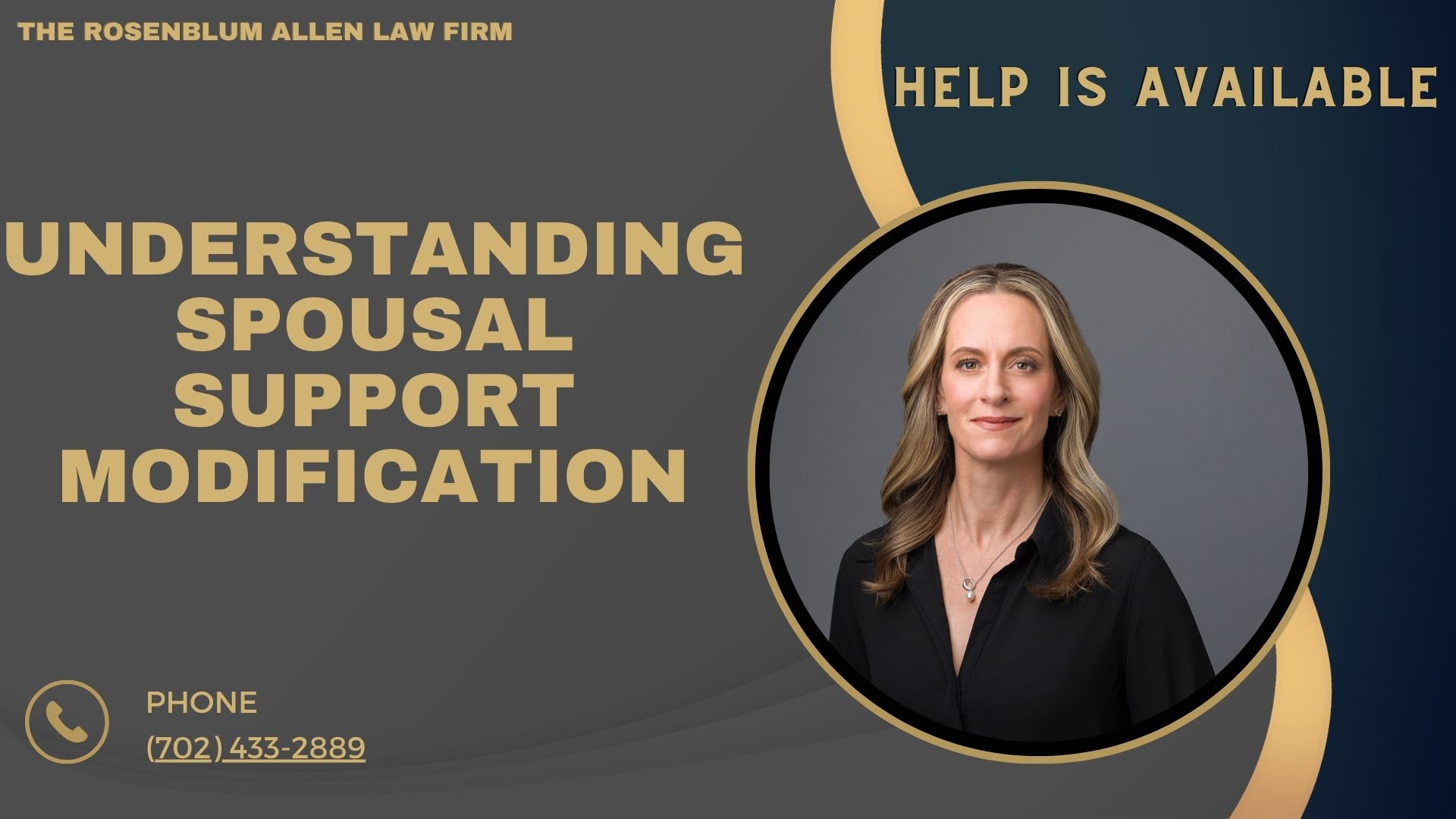When circumstances change after a divorce, spousal support may need change. Explore the factors. Explore the legal process for changing spousal support. Do this to ensure you’re informed and prepared.

Factors Influencing Spousal Support Modification
Change in Financial Circumstances
Loss of income due to job loss or reduced hours.
Increase in income from career advancements or new employment.
Change in employment status, such as transitioning from full-time to part-time work.
Change in Living Arrangements
Remarriage or cohabitation with a new partner.
Relocation to a different city or state.
Change in household expenses or financial responsibilities.
Change in Health or Disability
Significant deterioration in health affecting earning capacity.
Disability that impacts the ability to work and earn an income.
Increased medical expenses requiring financial support.
Duration of the Original Spousal Support Order
Evaluation of the duration specified in the initial spousal support agreement.
Consideration of any time limits or end dates outlined in the agreement.
Assessment of whether the original order still meets the needs of both parties.

Legal Grounds for Modifying Spousal Support
Large Change in Circumstances
To justify modification, one must make a significant change in circumstances.
Examples include loss of employment, remarriage, or severe illness.
The court evaluates whether the change is large and unforeseeable.
Material Change in Financial Situation
Evaluation of the financial circumstances of both parties.
Comparison of income levels, assets, and expenses since the original order.
Determination of whether a material change warrants modification of spousal support.
Termination of Spousal Support Obligation
Exploration of conditions under which spousal support may end.
Factors such as remarriage, cohabitation, or death of either party.
Legal requirements for notifying the court of changes that may affect spousal support.
Duration Limits on Spousal Support
Understanding any time limits or duration specified in the original order.
Evaluation of factors that may extend or shorten the duration of spousal support.
Consideration of circumstances that may warrant extension or termination of support.

Procedure for Modifying Spousal Support
Filing a Motion for Modification
To start, you must file a motion with the court. The court issued the original support order. This document formally requests a review and modification of the support terms. Your attorney can help you prepare this motion. They will ensure that it includes all needed info and documents.
Providing Evidence of Changed Circumstances
Gathering evidence is crucial to support your request for modification. This may include recent pay stubs, tax returns, and financial statements. They show changes in income or expenses since the original order. Also, documenting big life events, like job loss or illness, can help your case. So can events like remarriage.
Court Hearings and Proceedings
After filing the motion, the court will schedule a hearing to review your request. At the hearing, both parties will present their arguments and evidence. It’s essential to be prepared and clearly articulate your reasons for seeking modification. Your attorney will represent your interests and advocate throughout the proceedings.
Final Decision and Order by the Court
After the hearing, the judge will consider all the evidence. Then, they will decide on changing spousal support. If the court grants the change, it will issue a new order. The new order will outline the revised support terms. You must follow the court’s decision. Update any relevant finances as needed.

Documentation and Evidence Required
Financial Documents
Recent pay stubs or income statements.
Tax returns for the past few years.
Bank statements showing income and expenses.
Evidence of Changed Circumstances
Medical records documenting illness or disability.
Proof of job loss or employment changes.
Documentation of remarriage or cohabitation.

Potential Challenges and Considerations
Burden of Proof
You must prove a large change in circumstances to justify modification.
Providing clear and compelling evidence is essential to support your case.
Adverse Consequences of Non-compliance
Failure to follow spousal support orders can result in legal consequences.
It’s crucial to fulfill your obligations or seek modification if you cannot do so.
Emotional and Psychological Impact
The process of modifying spousal support can be emotionally challenging.
Seek support from friends, family, or a therapist to cope with any stress or anxiety.
Legal Costs and Attorney Fees
Legal representation is crucial for navigating the complexities of spousal support modification.
Discuss potential costs and fees with your attorney. This will help you understand your upfront financial obligations.

Consulting with a Family Law Attorney
Navigating the process of spousal support modification can be complex and overwhelming. Seek guidance from a knowledgeable family law attorney. You must ensure that you protect your rights and represent your interests well.
Importance of Seeking Legal Advice
A family law attorney can offer effective help. They can guide you through the process. They understand family law well. They can help you navigate the legal system with confidence. By consulting with an attorney, you can understand your rights and options. This will empower you to make informed decisions about your case.
Role of an Experienced Attorney
An experienced family law attorney will advocate for you. They will fight for a fair outcome. It will be favorable in your spousal support modification case. They will review your situation well. They will gather relevant evidence and plan a strategy for your court case. With their expertise and help, you can confidently navigate the legal process.

Finding the Right Legal Representation
Choose a family law attorney to represent you. They will help with your spousal support modification case. Trust and comfort are important. Look for a family law attorney with a proven track record in spousal support cases. Schedule meetings with possible attorneys. Discuss your case and find the best one for your needs.

Breaking It All Down
Changing spousal support can be daunting. But, with the right knowledge and guidance, you can navigate the legal system and get a fair outcome. You can make informed decisions about your case. Just understand the factors that affect spousal support. You should also know the legal reasons for change and the process. Remember, consulting with a family law attorney is essential. It helps you navigate well. It ensures protection of your rights immediately.

Frequently Asked Questions
Is it better to be the one who files for divorce?
Deciding who should file for divorce depends on individual circumstances. There’s no one-size-fits-all answer. But, being the filer has advantages. For example, it gives more control and can influence the court’s narrative.
What factors should I consider before filing for divorce?
Before filing for divorce, you must consider many factors. These include your emotional readiness, money, and the potential impact on your children. Also, assess the legal issues. These include property division, spousal support, and custody.
How does filing for divorce affect the divorce process?
Filing for divorce initiates the legal process of dissolving the marriage. The spouse who files (the petitioner) submits the needed paperwork to the court. This act officially starts the proceedings. This sets the timeline for the divorce process. It also determines the next steps, such as serving the other spouse with divorce papers.
Can filing for divorce influence the outcome of the divorce settlement?
The spouse who files for divorce may have some strategic advantages. They can influence the outcome of the divorce settlement. For example, they can choose where to file the divorce. They can pick a court with better laws or procedures. But, what happens depends on many factors. These include the details of each case and the judge’s choice.
How can I prepare to file for divorce?
Before filing for divorce, you must gather important financial documents. These include tax returns, bank statements, and property records. Consider consulting with a family law attorney to understand your rights and options. Preparing emotionally is vital. Divorce can be tough and stressful.
What are the potential drawbacks of being the one who files for divorce?
Filing for divorce may have strategic advantages. But, it also has potential drawbacks. Filing can be stressful and bring more responsibility. This is especially true if the other spouse contests the divorce or retaliates. Too, filing for divorce may affect negotiations. It will also affect the dynamics of the process.

Additional Resources for You
Don’t miss out on these invaluable resources developed by our lead attorney, Molly Rosenblum Allen, Esq., to support you during challenging times:
Las Vegas Divorce Attorney: Comprehensive guidance and legal representation tailored to your divorce needs in Las Vegas.
Nevada Divorce: Explore the specifics of divorce law in Nevada and understand your rights and options.
Surviving Divorce: Practical advice and support to help you navigate the emotional challenges of divorce.
What Happens If You Don’t Sign Divorce Papers: Learn about the consequences of refusing to sign divorce papers and how to protect your interests.
Do I Need an Attorney to Get a Divorce: Understand the importance of legal representation and the benefits of hiring a divorce attorney.
What is a Collaborative Divorce: Discover the collaborative divorce process and its potential advantages for you and your family.
How to Win a Divorce: Practical strategies and insights to help you achieve a favorable outcome in your divorce proceedings.
Switching Lawyers During Divorce: Learn about the process of changing legal representation during your divorce and how to ensure a smooth transition.
How Long Does a Divorce Take in Nevada: Understand the factors that can influence the duration of your divorce proceedings in Nevada.
High Conflict Divorce: Strategies for managing and navigating a high-conflict divorce with the help of experienced legal counsel.
Questions to Ask a Divorce Lawyer: Comprehensive list of questions to help you find the right divorce lawyer for your needs.

Outside Resources for You
Here are some offsite resources related to divorce that you may find useful:
American Bar Association (ABA): The ABA offers valuable resources and information on divorce laws, processes, and finding legal assistance.
Divorce Magazine: Divorce Magazine provides articles, guides, and effective advice on various aspects of divorce, including legal, financial, and emotional considerations.
DivorceCare: DivorceCare offers support groups, resources, and online materials to help individuals navigate the challenges of divorce and find healing.
National Association of Divorce Professionals (NADP): NADP connects individuals going through divorce with professionals specializing in various aspects of divorce, such as attorneys, financial planners, and therapists.
Divorce and Children: This site offers guidance and resources specifically aimed at helping parents navigate the challenges of divorce while prioritizing the well-being of their children.

A Special Message from Our Lead Attorney, Molly Rosenblum Allen, Esq

Thank you for choosing The Rosenblum Allen Law Firm as your partner in this journey. We’re here to support you every step of the way. If you’re ready to take the next step or have questions, schedule a free consultation with our team. Reach us at (702) 433-2889; one of our knowledgeable staff members will gladly assist you.
We look forward to serving you and providing the support you need.





